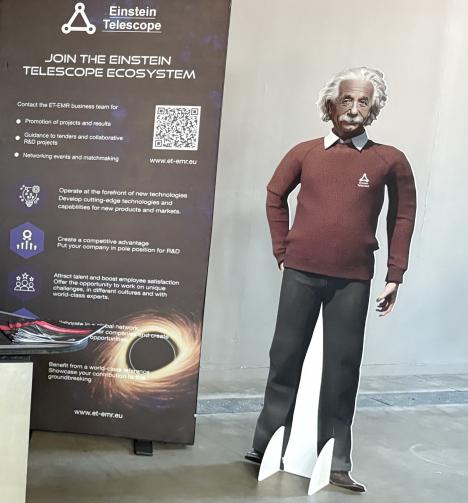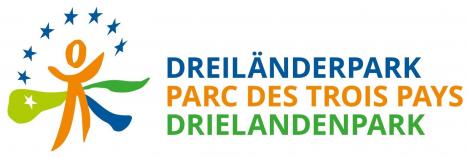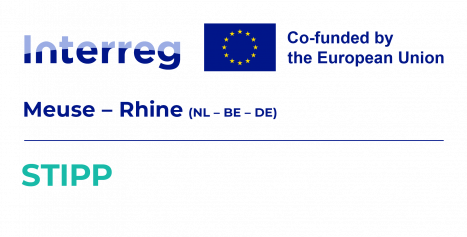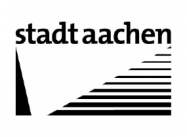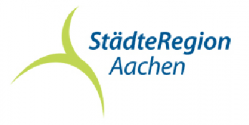
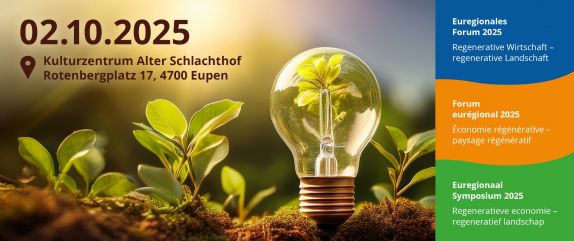
Euregional Symposium 2025
Crossing borders: Regenerative economy – Regenerative landscape
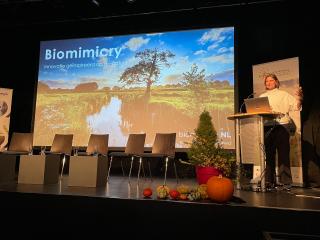

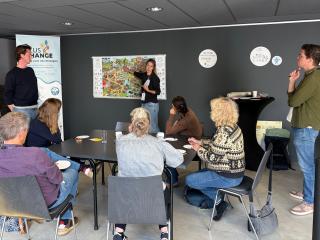
The 2025 Three Countries Park Symposium creates an innovative link between economy and ecology in the Meuse-Rhine Euroregion
Around 100 stakeholders from the Meuse-Rhine Euroregion – from the Netherlands, Belgium and Germany – came together at this year's Three Countries Park Symposium to discuss the future of a regenerative economy and landscape. The focus was on how economics and ecology can be actively combined and further developed across borders.
Supported by the STIPP innovation promotion programme of Interreg Meuse-Rhine, representatives from companies, economic agencies, nature and landscape parks, water associations and regional administrations discussed innovative approaches for a sustainable, nature-positive transformation.
From sustainable to regenerative development
The central theme of the forum was the concept of ‘regenerative development', which received special attention under the Belgian EU Presidency in 2024 (Regenerative Development and Design). Unlike traditional sustainability, regenerative development aims to actively repair environmental damage and create prosperity for all living beings. After all, their productive and value-adding activities form the basis of all economic activity.
‘It is important to understand regenerative development not as a new label, but as a profound change in our thinking – away from a mostly technological perspective and towards a life-centred one’, emphasised Dr Anja Brüll, coordinator of the Three Countries Park. ‘Only in this way can genuine regenerative innovations emerge that will drive forward the urgently needed transformation of the economy and society.’
Impulses from economy and research
Illustrative examples were provided by pitch talks from innovative companies such as EGGXPERT (Maastricht), INTEWA (Aachen) und PLANTC (Gembloux), whose projects demonstrate that economic success and ecological impact can go hand in hand (see more in the programme below).
A highlight was the keynote speech by Saskia van den Muijsenberg on biomimicry – the transfer of principles from nature to economic and technical innovations. ‘Nature has been successfully conducting research and development for 3.8 billion years. We can learn a lot from that’, said van den Muijsenberg.
Practical solutions for the future
Practical workshops examined specific topics, such as the connection between the circular economy and water management, regenerative agriculture as the basis for a sustainable bioeconomy, and landscape-friendly development around the Einstein Telescope.
Despite linguistic diversity, simultaneous interpreting ensured smooth communication and created a palpably optimistic, cross-border spirit of new departures.
When?
2 October 2025, 10h00 - 17h00
Where?
Kulturzentrum Alter Schlachthof
Rotenbergplatz 17
B - 4700 Eupen
With simultaneous translation in DE/FR/NL (except for workshops)
Programme 2/10/2025
| 09h00 | Reception & Registration |
| 10h00 | Welcome & Introduction Facilitator of the day - Simone van Trier, datspreekt Welcoming words - Michael Dejozé, director EGTC Euregio Meuse-Rhine • Martine Rousseau, coordinator STIPP, Interreg Meuse-Rhine SME Transition Innovation Partners Projects Introduction to (Re)Productivity, regenerative landscapes & development - Dr. Anja Brüll, coordinator Three-Countries Park |
| 10h30 | Impulses from 3 countries Pitchtalks from companies and organisations on regenerative approaches in theory and practice: Resourcing biobased mineral and proteins from eggshells: Dr. Rong Wang, Co-Founder/CEO EGGXPERT, Maastricht • Pioneers of water cycling technologies and rainwater beer: Oliver Ringelstein, Founder/director INTEWA GmbH, Aachen • Renewable energy and revenue from industrial wastewaters: François-Xavier Geubel, Administrateur délégué Anatis, Erpent • Regenerative investments – connecting businesses with local projects for climate, biodiversity and agroecology: Lucas Gossiaux, Foundateur associé PlantC, Gembloux • Regenerating Europe from the ground up: Alexander Zimmer, Marienburg and Marienhof Monheim, Top50 Farmer Europe 2025, European Alliance of Regenerative Agriculture EARA • Sneak peak Einstein-Telescope EMR between Universe and planet Earth: Marc Genten, Province de Liège and Euregio Meuse-Rhine, Johan Rutten, ET EMR project office |
| 11h30 | Coffee break |
| 11h50 | KEYNOTE on Biomimicry and regenerative leadership: Saskia van den Muijsenberg, BiomimicryNL |
| 12h20 | Panel discussion withSaskia van den Muijsenberg, Oliver Ringelstein, Lucas Gossiaux, François-Xavier Geubel, Alexander Zimmer, Martine Rousseau |
| 13h00 | Walking Lunch |
| 14h00 | Workshops - parallel sessions (see below) |
| 16h00 | Take-away messages, perspectives & conclusions |
| 16h20 | Drinks & Networking |
| 17h00 | End of the event |
Keynote Speaker
Saskia van den Muijsenberg
Saskia is the co-founder and Director of biomimicryNL and a Certified Biomimicry Professional. With over 30 years of experience in marketing, change management, strategic innovation, and biomimicry, she works with Fortune 500 companies and organisations of all sizes to spark innovation by applying nature’s design strategies to real-world challenges.
A natural storyteller and systems thinker, Saskia brings her passion for biomimicry to life—showing how learning from nature can inspire fresh ideas and new value models that help tackle today’s societal and business challenges.
Since 2010, she has built a strong biomimicry network in the Netherlands and beyond, inspiring thousands through keynotes, lectures, and workshops across Europe. Saskia has collaborated with hundreds of organisations, governments, schools, and universities, advancing the practice of biomimicry across disciplines and empowering people to rethink innovation and leadership through nature’s lens.
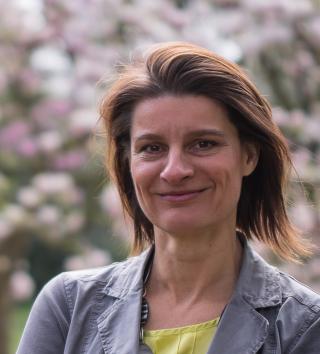
Workshops
Workshop 1 (DE/FR/NL): The Einstein Telescope - between Universe and Earth
Presentation and (panel) discussion with Johan Rutten, Manager Environment, Sustainability and Stakeholdership, Einstein Telescope project office • Marc Genten, representant Province de Liège, Euregio Meuse-Rhine • Ann-Sophie Debergh, Coordinator, Landscapepark Bocageland • Michelle Habets, Mayor, Municipality of Plombières
Workshop with simultaneous translation in DE, FR, NL
The Einstein-Telescope will open a new window into space and time. By observing gravitational waves and looking deep into the origins of the UNIVERSE, it will generate fundamental new knowledge in an unprecedented way, leading to future technologies. But what are technologies worth, if humanity is not able to maintain its home planet EARTH, the blue marble of our galaxy? Could ET EMR not only become a forerunner in space sciences and technologies, but equally a lighthouse project for sustainable development or even a promoter of regenerative leadership?
Extensive work is carried out during the feasibility study of ET EMR for environmental and stakeholder management taking several Sustainable Development Goals (SDGs) into account. Eco-innovative technologies are being explored, and impacts on biodiversity and landscape are being studied, searching for ways to improve rather than degrade it. How could the ET EMR not just try to minimize environmental impact, but support life (of all sorts) in the Landscape Park Bocageland, as its social-ecological home and thereby serve as a model beyond the Euregio?
We invite you to explore these questions with us in this workshop, introduced by a presentation on the feasibility study for sustainability of the ET EMR, followed by a (panel) discussion.
And what would Einstein have said about it?
“Look deep into nature, and then you will understand everything better.” – Albert Einstein
Workshop 2 (EN): Water cycles in landscapes, cities and industries
Talking circle with Dr. Grit Bürgow, Science & Society Office, TU Berlin,RoofWaterFarm and HypoWave • Oliver Ringelstein, INTEWA GmbH • Dr. Olga Murujew, coordinator Aix-Net-WWR • N.N.
Workshop held in English.
Water cycles are essential for Regeneration. In ecosystems, trees, beavers, soil creatures and other living beings act as daily water and land managers. They intercept, evaporate and infiltrate water. They slow down run-off, keep nutrients in place and rivers clear, dampen surface temperature, seed rain and make climate. In short, by creating small water cycles, healthy ecosystems not only provide (re)sources for drinking & process water, but regenerate the overall conditions for society and economy, and all life to thrive.
In this session we will explore the questions: How can rainwater and wastewater treatment technologies in cities and industries prevent pollution, floods and droughts, save nutrients and support the regeneration of water quality and water cycles in the landscape? How can they be applied in the Three-Countries Park? And how can we match capacities and join forces across borders?
Workshop 3 (EN): STIPP - SME cross-border cooperation for the green transformation
Cross-border match making with Martine Rousseau, coordinator STIPP, Interreg subsidy program • Olivier Heynen, Wallonie Entreprendre • Entrepreneurs from Wallonia, Flanders, Region Aachen, and Dutch Province Limburg
Workshop cancelled.
“Climate change knows no borders” – Angela Merkel. So why should we?
Join us for an engaging workshop designed to ignite cross‑border collaboration on green transformation in our border region. We will explore how small and medium-sized enterprises (SMEs) from different countries can come together to contribute to drive green transformation.Through real‑world case studies and general information about the cross-border subsidy program STIPP, participants will explore how joint innovation can drive environmental sustainability and regional resilience.
This interactive session aims to equip participants with insights and tools to spark regenerative collaborations that not only heal ecosystems but also build resilient, sustainable economies.
Workshop 4 (EN): Bioeconomy and regenerative agriculture
Covering new ground with Alexandra Silinski, Three-Countries Park, PLUS Change project • Bert Reubens, ILVO Instituut voor Landbouw-, Visserij. en Voerdingsoderzoek, AFaktive agroforestry for water management & adaptation •Christina Kuchendorf, BioökonomieRevier, AgroInnoLabs, humus formation with biochar • Lucas Gossiaux, Fondateur associé PlantC • Alexander Zimmer, Marienhof Monheim, European Alliance of Regenerative Agriculture EARA
Workshop held in English.
Sustainable bioeconomy and regenerative farming, including agroforestry, emerge as a promising fields of practice. More and more farmers do not only produce high quality food, but through their regenerative practice also bind carbon in soils, buffer water on their land, provide habitat for biodiversity and enrich the landscape.
At the same time, farmers complain that they are losing fertile land to both urbanization and nature conservation. In addition, the bureaucratic hurdles are high, especially when they farm land across borders in two countries in the border triangle. Female farmers who introduce social and ecological innovations on their farms find it more difficult to gain recognition and financing, as research projects such as GrassCeiling show.
In this session we will hear about exiting examples of regenerative agriculture, agroforestry and climate adaptation, and innovation for a sustainable bioeconomy. We will discuss how regenerative agriculture can be promoted in the Three-Countries Park, how we can join forces across borders and how women can gain importance as farm managers and agricultural innovators.
Workshop 5 (EN): Welcome to Circuville and Spongeland
Creative storytelling with Kimberly Major, Biobased Creations and Wouter Goudswaard, Studio Goudbaard • Nicolas Boey, Water-Land-Schap programma, Vlaamse Landmaatschappij (partners Horizon project PLUSChange) • Marjon Heutmekers, WWF Nederland, lead partner Interreg project SPONGE
Workshop held in English.
In this session we will explore change-in-the-making through arts and storytelling. In the Wimmelbild Circuville, which was created by Biobased Creations within the PLUS change project, you can discover many innovative and regenerative land use activities pioneering circular cities. Follow the characters through the picture and listen to their stories of a bright future.
However, circular cities need regenerative landscapes to thrive. Together, we will draft a complementary Wimmelbild “Spongeland”. We will draw (on) nature-based solutions which slow down water and restore the sponge function in our cross-border landscapes; and we will tell the stories of change-makers like the farmer, the water engineer, the mayor, the landscape architect or the business manager etc. who create, implement or invest in climate-resilient regenerative landscapes.
The Spongeland Wimmelbild will be prepared for the 3LP practice case in PLUS Change. Furthermore, it will also support the development of a cross-border Spongeland strategy during the newly approved Interreg project SPONGE.
“A human being is a part of the whole called by us universe, a part limited in time and space. He experiences himself, his thoughts and feelings as something separated from the rest, a kind of optical delusion of his consciousness. This delusion is a kind of prison for us, restricting us to our personal desires and to affection for a few persons nearest to us. Our task must be to free ourselves from this prison by widening our circle of compassion to embrace all living creatures and the whole of nature in its beauty.”
Albert Einstein
